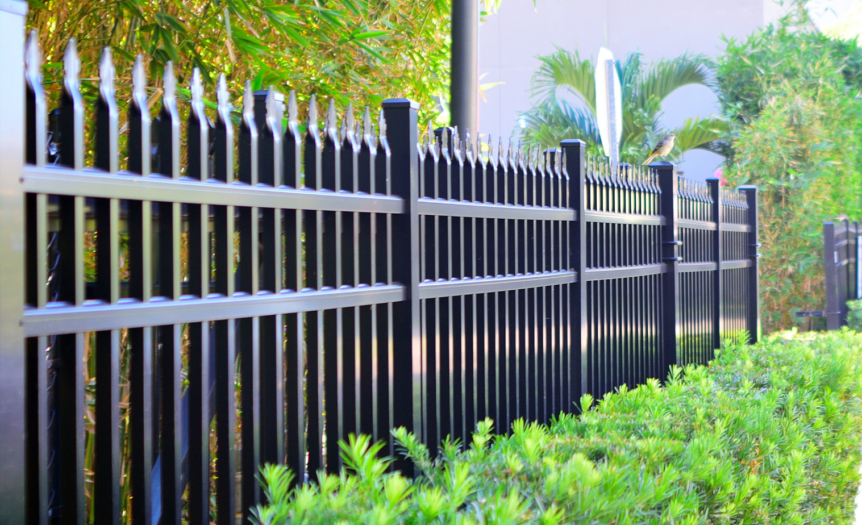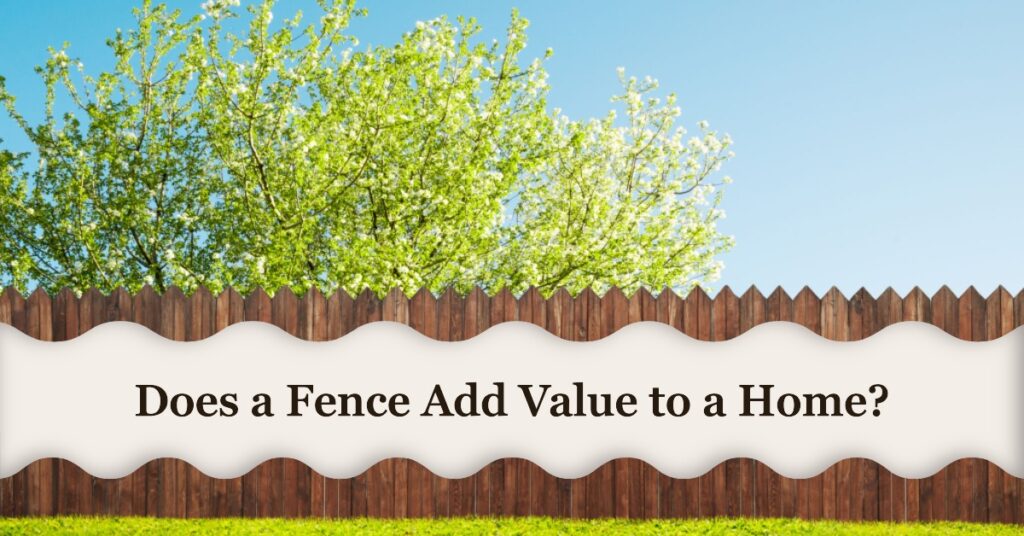In today’s real estate market, homeowners are constantly looking for ways to increase their property value and boost curb appeal. One aspect often considered is fencing – but does a fence truly add value to a home? The answer lies in several factors, including fence type, quality, aesthetics, and purpose.
In this blog post, we’ll delve into the relationship between fences and home values as well as discuss various types of fences that may impact your property’s worth.
The Relationship Between A Fence And Home Value
Installing a fence in your property can be a significant investment, and it’s essential to understand the impact it has on your home’s value.
Factors That Affect Fence Value
Various factors influence the value that a fence adds to a home, and understanding these aspects is crucial for homeowners to make an informed decision. One significant element is the material used in constructing the fence, as different materials offer various benefits and drawbacks.
For example, wooden fences are known for their aesthetic appeal but may require more maintenance than vinyl or aluminum fences.
Another essential factor is the design and functionality of the fence. A well-designed fence that suits the overall aesthetic of your home can significantly enhance its curb appeal, resulting in increased property value.
Moreover, if your fence serves multiple purposes – like providing privacy, safety for children or pets or demarcating property lines – it stands a better chance at increasing your home’s resale value.
Additionally, local regulations play a role in determining which type of fence will add value to your property; some neighborhoods have strict rules on height restrictions or certain materials allowed due to historical preservation efforts (e.g., using wrought iron fencing).
Video credit (Flip Anything USA)
Types Of Fences That Increase Home Value
Installing a fence around your property can boost its value, but not all fences are created equal. If you’re looking to increase the resale value of your home, it’s essential to choose the right type of fencing that appeals to potential buyers and enhances your property’s aesthetic.
Some of the most popular types of fences that raise home values include privacy fences, decorative fences, safety and security fences, pet-friendly fences, and eco-friendly options like bamboo or composite fencing.
Privacy fences offer homeowners seclusion from neighbors and busy streets while creating a cozy outdoor living space for entertaining guests or enjoying quiet evenings with family.
Decorative fencing like wrought iron or cast iron adds elegance and sophistication to any home exterior while increasing curb appeal. Safety and security-focused options such as chain-link or steel paneling provide an added layer of protection against intruders or wild animals without compromising on style.
In summary, choosing the right type of fence is crucial when considering adding value to your property through installation because it has various functions beyond serving just aesthetics purposes; some offer privacy; others cater more towards safety concerns while another group specifically designs for our four-legged companions who share our homes with us!
Reasons A Fence Might Not Add Value
While some types of fences can increase a home’s value, there are also instances where installing a fence may not add any significant value to the property. One reason for this is when the fence doesn’t match with the overall aesthetics of the neighborhood or surrounding homes.
Another reason why installing a fence may not add value is if it serves no practical purpose or if its maintenance cost is too high. If you install an elaborate decorative fence that looks stunning but requires extensive upkeep costs in terms of repairs or painting every year, it might end up costing more than what it’s worth over time.
Similarly, if you live in an area where crime rates are low and there’s no need for security fencing, then adding one might be unnecessary and could detract from your curb appeal instead of enhancing it.
Return On Investment For Fence Installation
Installing a fence around your property is undoubtedly an investment. Apart from the aesthetic appeal and added security, a well-installed fence can increase the overall value of your home when you decide to sell it down the line.
However, it’s important to consider your return on investment (ROI) before investing in a fence installation project.
The ROI for fence installation will depend on various factors such as material choice, quality of installation, size of property, location and even local real estate market trends.
According to some experts in real estate, installing a well-constructed wooden or vinyl fence can yield up to 50% ROI after resale.
Factors To Consider Before Installing A Fence
Before jumping into a fence installation project, there are several important factors to consider. From obtaining permits to understanding your neighborhood’s regulations and aesthetics, these crucial details can impact not only the value of your property but also your daily living.
Local Regulations And Permits
Before installing a fence, it’s vital to familiarize yourself with local regulations and obtain any necessary permits. Failing to do so can result in hefty fines or even legal action.
Regulations vary depending on the location, with some cities requiring specific types of fencing materials, certain fence heights, or setback distances from property lines.
In addition, some neighborhoods may have aesthetic guidelines that need to be adhered to when installing a fence.
It’s essential to research your area’s requirements before beginning your project. Contacting your local zoning board or city hall is a good starting point for obtaining information about what permits are needed and regulations you must follow.
Some areas also have homeowner associations that may have additional restrictions regarding fencing installations.
Neighborhood Aesthetics And Regulations
Neighborhood aesthetics and regulations play a significant role in deciding whether or not to install a fence. Consider the overall look of your community before choosing a fencing style.
While some neighborhoods might welcome ornate, decorative fences, others may require something simpler and more functional, like a chain-link fence.
The last thing you want is to invest time and money into installing an attractive fence only to have it violate HOA or zoning rules, resulting in hefty fines later on.
Material And Installation Costs
The cost of installing a fence can vary depending on the materials used and the size of the property. Wooden fences tend to be more affordable, while concrete or cast iron fences can be pricier due to their durability and longevity.
It’s important for homeowners to consider both material and installation costs before committing to a fence project. Some fencing companies offer free estimates, which can help determine an accurate cost estimate.
Maintenance And Upkeep
Keeping up with the maintenance of your fence is crucial to ensure it adds value to your home. Fences that are poorly maintained or damaged can actually detract from a home’s curb appeal and overall value.
Depending on the type of material used for your fence, maintenance needs may vary. For instance, wooden fences require more upkeep than vinyl or aluminum ones because they are prone to rotting and warping over time.
On the other hand, chain link fences need little maintenance beyond occasional rust removal. It’s important to consider these factors before installing a fence so you can budget accordingly for both installation and upkeep costs.
Types Of Fences That Increase Home Value
There are several types of fences that can increase home value, including privacy fences, decorative fences, safety and security fences, pet-friendly fences, and eco-friendly fences.
Privacy Fences
Privacy fences are among the most popular fence types that can significantly increase a home’s value. These fences offer homeowners an increased sense of security, as well as privacy from neighboring homes and busy streets.
They also provide a great way to create an outdoor living space that is both private and enjoyable.
Examples of materials commonly used for privacy fences include wood, vinyl, and metal fencing options. Each material has its advantages, with wood providing natural beauty and affordability while vinyl offers low maintenance and long-lasting durability.
Metal-based finishes like aluminum are strong enough to withstand extreme weather conditions but also expensive than other materials on this list.
Decorative Fences
Decorative fences can be an excellent addition to any home, especially those in historic or upscale neighborhoods. These types of fences add both aesthetic appeal and value to your property.
A decorative fence serves not only as a barrier but also as part of the overall outdoor décor. It creates a focal point for your front yard landscaping and adds an extra layer of sophistication to your curb appeal.
With their elegant design choices, they can bring out the best features of your property while hiding unsightly ones. Choosing the right decorative fence style complements architectural details like shutters or window boxes and enhances other backyard features like patios, garden beds, or walkways.
Safety And Security Fences
Safety and security are among the top reasons homeowners install fences. A fence can provide a physical barrier that protects children and pets from leaving the yard, keeping them safe from nearby streets or hazards.
When it comes to safety and security fences, one popular option is chain link fencing with barbed wire on top. These types of fences are often seen around commercial buildings or high-security areas because they offer a strong physical barrier that keeps people out.
Overall, choosing the right type of safety and security fence depends on your specific needs; you should consider factors such as location, budget, material, height requirements along with any local regulations when deciding what kind would work best for you.
Pet-Friendly Fences
Pet owners often prioritize the safety and security of their furry friends when considering fencing options. A pet-friendly fence could increase your home’s value if it provides a secure barrier for animals to roam freely without fear of escaping or being harmed by outside factors.
Chain-link and metal fences with small gaps between pickets are popular choices for pet owners because they provide maximum durability, visibility, and containment.
However, some areas may require additional fencing measures to safeguard animals against wildlife that might harm them, such as coyotes or bears. Additionally, homeowners should consider whether their chosen fence materials present any hazards to pets themselves (e.g., sharp edges, toxic paint).
Eco-Friendly Fences
Eco-friendly fences can add value to your home in more ways than one. Not only do they provide a functional purpose, but they also help with the conservation of natural resources and contribute to a healthier environment.
For example, bamboo fencing is an excellent eco-friendly option as it’s renewable, sustainable and biodegradable.
By choosing an eco-friendly fence, you’re not only adding value to your home financially but also environmentally. These types of fences are becoming increasingly popular due to their low maintenance requirements, durability and sustainability qualities.
Conclusion
In summary, adding a fence to your home can potentially increase its value, but it depends on several factors such as the type of fence, local regulations, and maintenance costs.
Privacy fences, decorative fences, safety and security fences or pet-friendly fences are among the types of fencing that have been proven to enhance property values. Before installing a fence in your yard or garden consider getting permits from your local authorities and ensure that it is aesthetically pleasing to match neighborhood standards.
Investing in a high-quality and durable fence may cost you upfront but provide a good return on investment in the long run.







